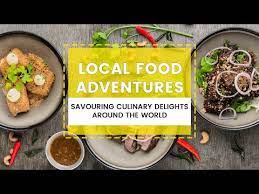Culinary Adventures: Learning to Cook Local Dishes Abroad

Embarking on a journey to explore new lands not only offers the chance to witness breathtaking landscapes and immerse oneself in diverse cultures but also presents a unique opportunity to savor the authentic flavors of local cuisine. For many travelers, the culinary aspect of a trip is an essential and enriching experience, and what better way to bring a piece of the destination home than by learning to cook local dishes? In this exploration of culinary adventures abroad, we delve into the joys of discovering, preparing, and savoring the authentic flavors of foreign cuisines.
Exploring Local Markets:
One of the first steps in a culinary adventure is a visit to the local markets. These vibrant hubs offer a sensory feast of colors, aromas, and textures. Strolling through bustling marketplaces provides insight into the ingredients that form the backbone of regional cuisines. Engaging with local vendors, sampling exotic produce, and observing traditional cooking methods lay the foundation for a deeper understanding of the culinary tapestry of the destination.
Joining Cooking Classes:
To truly immerse oneself in the local culinary culture, participating in cooking classes is an invaluable experience. Whether it’s a family-run kitchen, a professional cooking school, or a local’s home, these classes offer hands-on learning experiences. Expert chefs or seasoned home cooks guide participants through the intricacies of preparing signature dishes, sharing anecdotes, techniques, and the cultural significance of each recipe. It’s a chance not only to learn new skills but also to forge connections with the local community.
Mastering Authentic Recipes:
Bringing the flavors of a destination home involves mastering authentic recipes. From mastering the art of crafting handmade pasta in Italy to perfecting the balance of spices in a traditional curry in India, the goal is to replicate the essence of local dishes. Armed with newfound knowledge, culinary enthusiasts can recreate the magic of their travel experiences in their own kitchens, sharing the tastes and stories with friends and family.
Embracing Cultural Significance:
Beyond the act of cooking, delving into local cuisine is an exploration of cultural history and tradition. Each dish carries a narrative, reflecting the region’s history, agriculture, and the cultural influences that have shaped its flavors over time. Understanding the cultural significance of ingredients and cooking methods adds layers of appreciation to the culinary adventure, turning a simple meal into a meaningful connection with the destination.
Navigating Language Barriers:
Embarking on a culinary adventure in a foreign land often involves navigating language barriers, adding an element of challenge and excitement. In local markets or cooking classes, where communication might rely on gestures and shared enthusiasm, participants discover the universal language of food. The mutual passion for creating and enjoying delicious meals becomes a bridge that transcends linguistic differences, fostering connections and friendships.
Fostering Global Connections:
Learning to cook local dishes abroad extends beyond acquiring recipes; it fosters global connections. Culinary adventures create shared experiences with locals and fellow travelers, forging connections over shared meals. Whether it’s joining a communal cooking class or being invited into a local home, these moments of culinary camaraderie transcend cultural differences, reinforcing the idea that food has the power to unite people from diverse backgrounds.
Preserving Culinary Traditions:
As globalization continues to influence culinary landscapes, there is a growing awareness of the importance of preserving traditional recipes and culinary techniques. Learning to cook local dishes abroad becomes a form of cultural preservation, ensuring that time-honored recipes are passed down to future generations. Culinary enthusiasts become stewards of authenticity, contributing to the sustainability of culinary traditions around the world.
Conclusion:
Culinary adventures, centered around learning to cook local dishes abroad, transform the act of eating into a rich and immersive exploration of culture, history, and tradition. Beyond the pleasure of savoring delicious meals, these experiences offer a deeper understanding of the places we visit. They create lasting connections, not only with the flavors of a destination but also with the people who generously share their culinary heritage. In the kitchen, as ingredients come together to create a symphony of tastes, travelers embark on a journey that goes beyond sightseeing—it’s a culinary voyage that engages the senses, enriches the soul, and brings the world closer, one delicious dish at a time.






